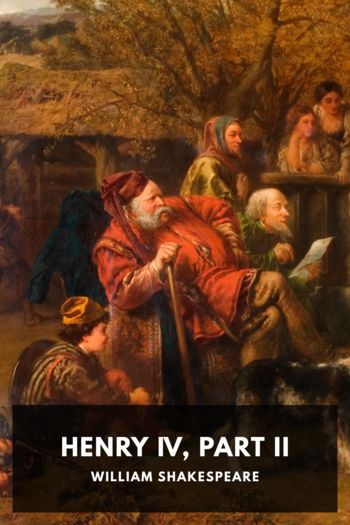Henry IV, Part II William Shakespeare (sight word readers TXT) 📖

- Author: William Shakespeare
Book online «Henry IV, Part II William Shakespeare (sight word readers TXT) 📖». Author William Shakespeare
Yorkshire. Gaultree Forest.
Enter the Archbishop of York, Mowbray, Hastings, and others. Archbishop What is this forest call’d? Hastings ’Tis Gaultree Forest, an’t shall please your grace. ArchbishopHere stand, my lords; and send discoverers forth
To know the numbers of our enemies.
’Tis well done.
My friends and brethren in these great affairs,
I must acquaint you that I have received
New-dated letters from Northumberland;
Their cold intent, tenour and substance, thus:
Here doth he wish his person, with such powers
As might hold sortance with his quality,
The which he could not levy; whereupon
He is retired, to ripe his growing fortunes,
To Scotland: and concludes in hearty prayers
That your attempts may overlive the hazard
And fearful melting of their opposite.
Thus do the hopes we have in him touch ground
And dash themselves to pieces.
West of this forest, scarcely off a mile,
In goodly form comes on the enemy;
And, by the ground they hide, I judge their number
Upon or near the rate of thirty thousand.
The just proportion that we gave them out
Let us sway on and face them in the field.
Health and fair greeting from our general,
The prince, Lord John and Duke of Lancaster.
Say on, my Lord of Westmoreland, in peace:
What doth concern your coming?
Then, my lord,
Unto your grace do I in chief address
The substance of my speech. If that rebellion
Came like itself, in base and abject routs,
Led on by bloody youth, guarded with rags,
And countenanced by boys and beggary,
I say, if damn’d commotion so appear’d,
In his true, native and most proper shape,
You, reverend father, and these noble lords
Had not been here, to dress the ugly form
Of base and bloody insurrection
With your fair honours. You, lord archbishop,
Whose see is by a civil peace maintained,
Whose beard the silver hand of peace hath touch’d,
Whose learning and good letters peace hath tutor’d,
Whose white investments figure innocence,
The dove and very blessed spirit of peace,
Wherefore do you so ill translate yourself
Out of the speech of peace that bears such grace,
Into the harsh and boisterous tongue of war;
Turning your books to graves, your ink to blood,
Your pens to lances and your tongue divine
To a trumpet and a point of war?
Wherefore do I this? so the question stands.
Briefly to this end: we are all diseased,
And with our surfeiting and wanton hours
Have brought ourselves into a burning fever,
And we must bleed for it; of which disease
Our late king, Richard, being infected, died.
But, my most noble Lord of Westmoreland,
I take not on me here as a physician,
Nor do I as an enemy to peace
Troop in the throngs of military men;
But rather show awhile like fearful war,
To diet rank minds sick of happiness
And purge the obstructions which begin to stop
Our very veins of life. Hear me more plainly.
I have in equal balance justly weigh’d
What wrongs our arms may do, what wrongs we suffer,
And find our griefs heavier than our offences.
We see which way the stream of time doth run,
And are enforced from our most quiet there
By the rough torrent of occasion;
And have the summary of all our griefs,
When time shall serve, to show in articles;
Which long ere this we offer’d to the king,
And might by no suit gain our audience:
When we are wrong’d and would unfold our griefs,
We are denied access unto his person
Even by those men that most have done us wrong.
The dangers of the days but newly gone,
Whose memory is written on the earth
With yet appearing blood, and the examples
Of every minute’s instance, present now,
Hath put us in these ill-beseeming arms,
Not to break peace or any branch of it,
But to establish here a peace indeed,
Concurring both in name and quality.
When ever yet was your appeal denied?
Wherein have you been galled by the king?
What peer hath been suborn’d to grate on you,
That you should seal this lawless bloody book
Of forged rebellion with a seal divine
And consecrate commotion’s bitter edge?
My brother general, the commonwealth,
To brother born an household cruelty,
I make my quarrel in particular.
There is no need of any such redress;
Or if there were, it not belongs to you.
Why not to him in part, and to us all
That feel the bruises of the days before,
And suffer the condition of these times
To lay a heavy and unequal hand
Upon our honours?
O, my good Lord Mowbray,
Construe the times to their necessities,
And you shall say indeed, it is the time,
And not the king, that doth you injuries.
Yet for your part, it not appears to me
Either from the king or in the present time
That you should have an inch of any ground
To build a grief on: were you not restored
To all the Duke of Norfolk’s signories,
Your noble and





Comments (0)